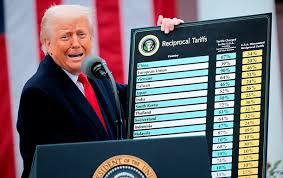Shippers hold their breath as Trump appeals court ruling that tariffs are illegal
Any shipper waking up to discover that large swathes of President Trump's tariffs have been ruled illegal should not celebrate just yet.
The White House has submitted an appeal against the judgment by the Us Court of International Trade that ruled that the president had overreached his authority in imposing reciprocal and fentanyl tariffs by using the International Emergency Economic Powers Act (IEEPA).
The court gave the Trump administration 10 calendar days to issue "necessary administrative orders" to end the impacted tariffs - but the White House appeal requests seven days to "to allow time for the Federal Circuit to consider a motion to stay and request for administrative stay".
Responses to the White House's motion to suspend the order, pending appeal, are due by 18 June - a more than two-week wait.
While it is highly likely that the decision will end with the Supreme Court, the White House has other tools at its disposal to introduce tariffs.
Meanwhile those on autos, steel, and aluminium remain, as they were invoked under a different law.
The question that remains unanswered for shippers with freight en route to the US will be how the Customs and Border Protection agency (CBP) deals with imports when they arrive - in theory, US importers can ask for a refund on tariffs paid already, but whether that will be enforceable is again unknown.
Even if Mr Trump loses his appeal, under the Trade Act of 1974 the president is able to impose tariffs of 15% for up to 150 days on countries with which there is a big trade deficit.
In submitting an appeal and asking for a 'stay', or pause, on the judgment, the president's lawyers wrote: "In sharp contrast to the extraordinary harm to defendants, a stay will not substantially injure the plaintiffs. For any plaintiff who is an importer, even if a stay is entered and we do not prevail on appeal, plaintiffs will assuredly receive payment on their refund with interest.
"There is virtually no risk' to any importer that they would not be made whole' should they prevail on appeal. The most 'harm' that could incur would be a delay in collecting on deposits. This harm is, by definition, not irreparable. Plaintiffs will not lose their entitlement to refund, plus interest, if the judgment is stayed, and they are guaranteed payment by defendants should the court's decision be upheld. And defendants do not oppose the reliquidation of any entries of goods subject to lEEPA duties paid by plaintiffs that are ultimately found to be unlawful after appeal."
The judgment gave some colour as to the challenges faced by US importers due to the tariffs.
Twelve states, as well as five importers, led by wine importer VOS Selections, showed that the tariffs were "likely to cause an economic injury", as well as "difficulties with sourcing and pricing", and also that "the reduction in cash flow caused by increased tariffs also necessarily reduces the company's inventory and the level of business that VOS can conduct, leading to an overall reduction in purchase orders...".
VOS argued that the tariffs put "a large, immediate, strain on its cash flow", while fellow plaintiff Genova Pipe pointed to sourcing problems, claiming: "Tariffs will directly increase the cost of raw materials,
• manufacturing equipment, and resale goods imported from abroad by Genova Pipe".
MicroKits alleged that at the current rates, it "cannot order parts from China and will have to pause operations when it runs out of parts", and also that as a result it "will likely be unable to pay its employees, will lose money, and as a result may go out of business".
FishUSA noted that tariffs had "caused [it] to delay shipment of finished goods from China due to the unpredictability of the tariff rate that will be imposed when the product arrives, and [that] it has also paused production of some products", and that these conditions inhibited its business growth.
And Terry Cycling claimed it had "already paid $25,000 in unplanned tariffs this year for goods for which Terry was the importer of record", and there were "projects that the tariffs will cost the company approximately $250,000 by the end of 2025".
The court judged that the Trafficking Orders - ie, the fentanyl tariff - did not "deal with" its stated objectives. It added: "Rather, as the government acknowledges, the orders aim to create leverage to 'deal with' those objectives.
"A tax deals with a budget deficit by raising revenue. A dam deals with flooding by holding back a river. But there is no such association between the act of imposing a tariff and the unusual and extraordinary threat[s] that the Trafficking Orders purport to combat," ruled the court.
And the worldwide and retaliatory tariffs, meanwhile, "exceed any authority granted to the president".
• It summed up: "The court holds, for the foregoing reasons, that lEEPA does not authorise any of the worldwide, retaliatory, or trafficking tariff orders.

